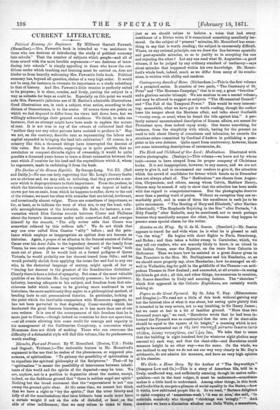The Decline of the Roman Republic. By George Long. Vol.
III. (Bell and Daldy.)—No one can help regretting that Mr. Long's literary faults are so 'obvious and, we may add, so irritating, that they provoke a cen- sure which is disproportionate to their importance. From the preface, in which the historian takes occasion to complain of an impost of half-a- crown per ton on coals, from which he happens to suffer, down to the end of the volume, we meet too often with remarks that are trivial, irrelevant, and'occasionally almost vulgar. These are sometimes of importance, so far, at least, as to indicate the want of what are, to say the least, valu- able accomplishments of the historian. He finds, for instance, a con- versation which Dion Cassius records between Cicero and Philiscus about the former's demeanour under exile somewhat dull, and avenges himself by the remark, " The silly writer adds that Cicero was somewhat relieved by this tedious talk." We do not think that any one ever called Dion Cassius " silly " before ; and the petu- lance which employs so inappropriate an epithet does not become an historian. Again, a propos of an allusion in the funeral oration of Julius Caner over his Aunt Julia to the legendary descent of the family from Venus, he uses such phrases as "impudent lie," and "silly boast," both most out of place. If he would look at a formal pedigree of Queen Victoria, he would probably see her descent traced from Odin ; and he would probably shrink from applying the terms liar and fool to any one who, in the rhetorical language of oratory, might speak of her as "tracing her descent to the greatest of the Scandinavian divinities." Clearly there is here a defect of sympathy. But some of the most valuable qualities of an historian Mr. Long certainly possesses ; he has patience, industry, learning adequate to his subject, and freedom from that mis- chievous habit which seems to be growing more confirmed in our historians, the more ambitiously they aspire to a philosophical method, of bending facts to suit preconceived theories. In particular, looking at the point which the inevitable comparison with Mommsen suggests, he has not been perverted to that degrading Caosar-worship which has fascinated the great German historian, as it has more than one of our own writers. It is one of the consequences of this freedom that he is more just to Cicero,—though indeed on occasions be does not spare him, —at all events allowing him some credit for courage and capacity in his management of the Catilinarian Conspiracy, a concession which Mommsen does not think of making. Those who can overcome the difficulty of a distasteful style will find this volume, like its predecessors, worth reading.


































 Previous page
Previous page